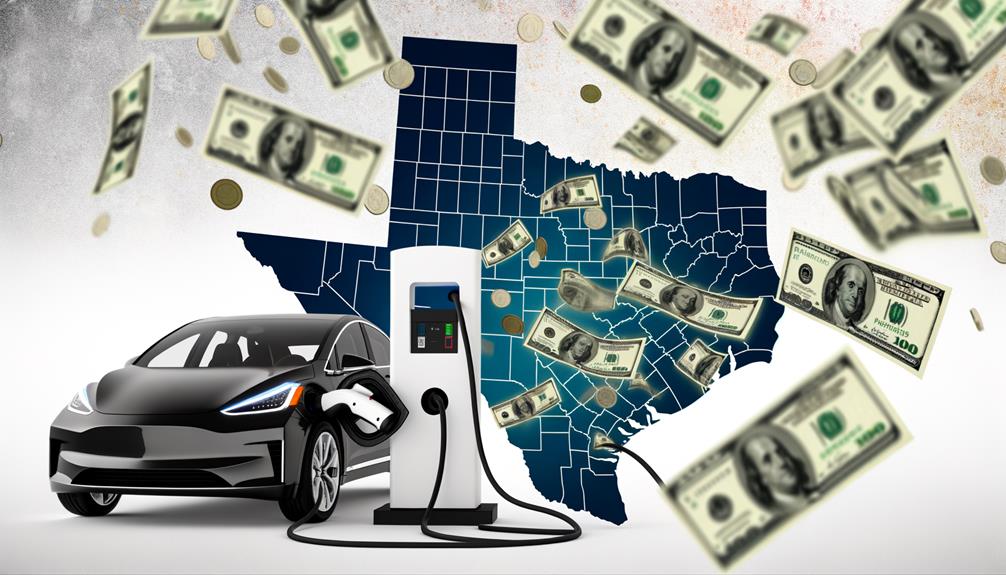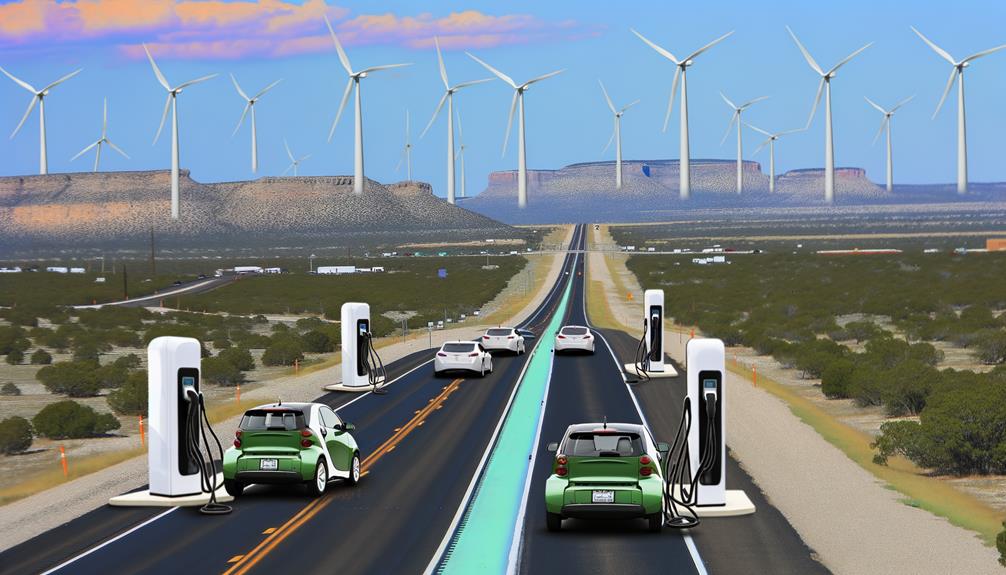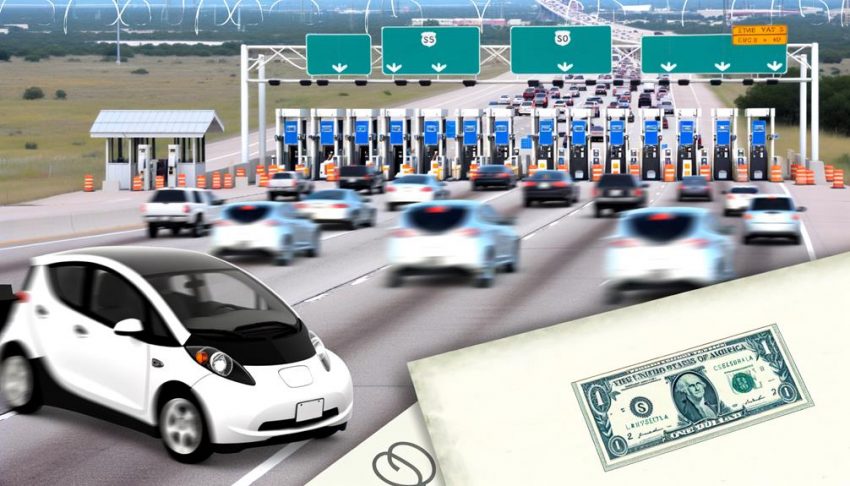You might be wondering if Texas has jumped on the bandwagon of charging electric car fees, and the answer is yes. As of September 1, 2023, Texas requires electric vehicle (EV) owners to pay a registration fee under Senate Bill 505. First-time registration will set you back $400 for the initial two years, followed by an annual renewal fee of $200. This move aims to make up for the gasoline tax revenue shortfall. But what does this mean for the financial landscape of EV ownership and the future of electric vehicles in Texas?
Contents
Overview of EV Fee
Starting September 1, 2023, Texas has implemented a new registration fee structure for electric vehicle (EV) owners, reflecting the state's effort to balance infrastructure funding amid rising EV adoption. If you're an EV owner in Texas, you'll now face a $400 fee for first-time registration, covering the initial two years. After that, the renewal fee drops to $200 annually. This new registration fee is Texas's response to the growing number of electric vehicles, aimed at compensating for the lost gasoline tax revenue that traditionally supports road construction and maintenance.
The Texas Department of Transportation (TxDOT) has estimated that there are approximately 200,000 electric vehicles currently registered in the state. With the introduction of these electric vehicle registration fees, the state anticipates generating around $38 million in revenue annually. This revenue is vital for maintaining Texas's extensive network of highways and roads, which have historically been funded by gasoline taxes—a revenue stream that's dwindling as more drivers switch to electric vehicles.
EV owners should understand that these fees are part of a broader strategy to guarantee that all road users contribute fairly to the upkeep of transportation infrastructure. While the upfront cost may seem steep, it aligns with the state's need to adapt to changing transportation trends and economic realities. As EV adoption continues to rise, the Texas Department of Transportation hopes this fee structure will help maintain the quality of roads without placing an undue burden on any single group of motorists. So, while the new fees might be a financial pinch, they're designed to support the long-term sustainability of Texas's roadways.
Legislative Background
Understanding the rationale behind Texas's new EV fee requires examining the legislative groundwork that set it in motion. The electric vehicle registration fees stem from Senate Bill 505, an important piece of legislation passed in 2023. This bill was introduced to tackle the funding shortfalls caused by the increasing number of EVs on the road, which don't contribute to gasoline tax revenue—the primary funding source for the State Highway Fund used for road construction and maintenance.
Governor Greg Abbott signed Senate Bill 505 into law, and it took effect on September 1, 2023. The law mandates a $400 fee for new EV registrations and a $200 annual renewal fee. These fees are designed to offset the estimated $200 annual loss per EV in gasoline tax revenue, ensuring that EV owners contribute fairly to the upkeep of Texas's road infrastructure.
The legislation is a response to the growing trend of EV ownership in Texas, which saw around 200,000 registered electric vehicles at the time of the law's enactment. Let's break down the key elements:
| Element | Details |
|---|---|
| Legislation | Senate Bill 505 |
| Effective Date | September 1, 2023 |
| Fees | $400 for new registrations, $200 for renewals |
This initiative reflects a broader effort to maintain financial stability within the State Highway Fund, ensuring that the shift toward electric vehicles doesn't undermine essential infrastructure funding. As EV adoption continues to rise, these electric vehicle registration fees are seen as a necessary adjustment to the evolving automotive landscape. By examining these legislative actions, you can better understand the state's approach to balancing innovation with fiscal responsibility.
Financial Implications

With Texas imposing a $400 initial registration fee and a $200 renewal fee for electric vehicles, you're looking at a significant financial commitment compared to the $50 fee for traditional vehicles. These fees aim to compensate for the $200 in lost annual gasoline tax revenue per EV, essential for funding road infrastructure. As EV adoption grows, this policy could generate substantial revenue, yet it underscores the broader challenge of maintaining highway funding in a shifting automotive landscape.
Initial Fee Impact
The imposition of a $400 first-time registration fee for new electric vehicle (EV) owners in Texas represents a significant financial shift compared to traditional vehicle registration costs, which hover around $50. This stark increase in electric vehicle registration fees aims to address the shortfall in gasoline tax revenue, a critical component for maintaining the State Highway Fund.
For new EV owners, the first-time registration fee adds a substantial upfront cost, altering the financial landscape of EV ownership. While the gasoline tax traditionally funds road infrastructure, EVs contribute little to this revenue stream, necessitating alternative funding methods. Texas lawmakers argue that each EV results in a $200 annual loss in gasoline tax revenue, justifying the hefty first-time registration fee.
This financial burden extends beyond the initial purchase, affecting the overall cost-benefit analysis for potential EV buyers. The new registration fee imposes nearly $350 in initial registration costs and positions Texas as a state with one of the highest EV registration fees in the country. By understanding these financial implications, you can better navigate the evolving landscape of EV ownership in Texas and make informed decisions about your transportation investments.
Renewal Fee Obligations
Maneuvering the financial landscape of owning an electric vehicle in Texas becomes even more complex with the imposition of a $200 biennial renewal fee, effective September 1, 2023. This renewal fee is not a one-time expense but a recurring obligation every two years, adding a significant layer to your budget planning. While the initial registration fees for electric vehicles already set a high entry point, the renewal fee compounds the financial commitment for long-term EV ownership.
Compared to traditional vehicle registration fees in Texas, which hover around $50 annually, the $200 biennial fee for electric vehicles stands out. It underscores a substantial financial differential aimed at balancing the state's revenue streams, as EVs generally contribute less to fuel tax revenues. The total upfront cost for new EV buyers now includes a hefty $400, combining both the initial and renewal fees. This makes the cost of registering an electric vehicle considerably higher than that of a conventional vehicle.
Texas allocates these collected renewal fees to the State Highway Fund, supporting infrastructure projects. However, for EV owners, these recurring registration fees represent a significant ongoing financial responsibility that requires careful consideration and planning.
Infrastructure Funding Allocation
Balancing the financial equilibrium of Texas's transportation infrastructure has become increasingly complex with the advent of electric vehicle (EV) adoption. To tackle this challenge, Texas has implemented new electric vehicle registration fees: a $400 fee for new registrations and a $200 renewal fee. These fees are expected to generate around $38 million annually, directly supporting infrastructure funding.
As an EV driver, you're contributing to the State Highway Fund, which is vital for sustaining Texas's highway maintenance and road construction projects. Here's how the funds are allocated:
- Offsetting Fuel Tax Revenue Loss: The average EV driver's contribution through gasoline taxes is about $200 annually. The new fees guarantee that EV drivers are still playing their part in maintaining Texas roads.
- State Highway Fund: All collected fees go into this fund, which is fundamental for ongoing and future transportation projects.
- Addressing EV Growth: With approximately 200,000 EVs in Texas, the state guarantees equitable contribution to highway maintenance costs.
- Supplementing Fuel Tax Revenue: With $2.8 billion projected from motor fuel taxes in 2024, these fees help bridge the gap as EV adoption grows.
Technological Context
Amid the rapidly evolving landscape of electric vehicle technology, Texas' new fee structure for EVs underscores the intersection of innovation and infrastructure funding. As an EV owner in Texas, you're now subject to a $400 registration fee for new electric vehicles and a $200 renewal fee, effective from September 1, 2023. These electric vehicle registration fees were introduced by Senate Bill 505 to address the loss of gasoline tax revenue, traditionally used for road construction and maintenance. This legislative move is critical as the state grapples with the dual challenges of burgeoning EV adoption and the need to fund its extensive highway infrastructure.
The rise in EV ownership in Texas is significant, with around 200,000 electric vehicles registered as of the new legislation. This surge reflects a broader trend towards sustainable transportation, yet it poses a financial conundrum. Gasoline tax revenue, which has long been the cornerstone of infrastructure funding, is dwindling as more drivers shift to electric vehicles. To bridge this gap, Texas has implemented these fees to guarantee that EV owners contribute fairly to the upkeep of the state's highways.
The technology behind electric vehicles, including advancements in battery life, efficiency, and charging infrastructure, is accelerating at a remarkable pace. However, these innovations necessitate a reevaluation of how road maintenance is funded. Texas is not alone in this endeavor; at least 32 other states have enacted similar fees ranging from $50 to $225 annually. By instituting these fees, Texas aims to balance the benefits of cutting-edge EV technology with the practical needs of maintaining robust and safe infrastructure for all its residents.
Registration Fee Comparison

As Texas adapts its infrastructure funding to the burgeoning adoption of electric vehicles, it's instructive to examine how the state's new registration fees compare to those in other parts of the country. Texas has set a first-time registration fee of $400 for new electric vehicle (EV) owners, with a subsequent annual renewal fee of $200, effective September 1, 2023. These fees are considerably higher than the state's standard vehicle registration fees, which hover around $50.
When evaluating electric vehicle registration fees across the U.S., it becomes clear that Texas's approach is on the upper end of the spectrum. Here's a breakdown of how Texas stacks up against other states:
- High Initial Cost: Texas's $400 first-time registration fee for new electric vehicles is among the highest in the country. For comparison, the most expensive are typically around $225 annually, such as in Georgia.
- Annual Renewal: The $200 renewal fee in Texas is also steep. Many states, like California, have annual fees ranging from $100 to $175, although these are subject to inflation adjustments.
- Standard Fee Contrast: With standard vehicle registration fees in Texas at roughly $50, the disparity is stark. The intent is to offset the estimated $200 annual loss in gasoline tax revenue per EV, essential for road maintenance and construction.
- Wide Implementation: As of the latest data, at least 32 states have implemented special electric vehicle registration fees. The Department of Energy indicates this trend is growing as states seek to balance their budgets with the rise of electric vehicles.
Incentives for EVs
Texas's incentives for electric vehicles (EVs) are relatively limited, especially when compared to other states with robust EV adoption programs. While Texas does offer rebates of up to $2,500 for new hydrogen fuel cell, electric, or hybrid vehicles, these are capped at 2,000 vehicles every two years. This cap means that not all electric vehicle owners will benefit from state-level incentives.
To understand how Texas's incentives stack up, let's look at the following table:
| Incentive Type | Details | Availability |
|---|---|---|
| State Rebate | Up to $2,500 for new EVs | Capped at 2,000 vehicles/2 years |
| Federal Tax Credit | Up to $7,500 for eligible clean vehicles | Subject to income limits and certain models |
| Home EV Charging Credit | Reinstated federal tax credit for chargers | Nationwide |
| Previous State Tax Credit | Expired January 2023 | No longer available |
| Registration Fees | New fees implemented | Texas-specific |
Federal tax credits provide some relief, offering up to $7,500 for eligible new clean vehicles, though this is subject to income limits and specific EV models. This federal incentive is vital for electric vehicle owners, especially given the expiration of Texas's state tax credit in early January 2023.
Beyond vehicle purchase incentives, the reinstated federal tax credits for EV charging stations can aid in setting up home charging infrastructure, promoting easier EV adoption. However, the new registration fees in Texas somewhat counter these benefits, leading to calls for expanded state-level rebates and incentives to offset the impact.
Future of EV Adoption

The future of EV adoption in Texas hinges on a delicate balance between advancing infrastructure and refining incentives. As you look ahead, several key factors will shape the EV landscape in the Lone Star State.
- Infrastructure Expansion: The success of EV adoption depends on the growth of new electric vehicle charging stations. Texas is already making strides, but continued investment is vital to meet the anticipated rise in EV registrations. This expansion will alleviate range anxiety, making EVs a more viable option for daily commutes and long-distance travel.
- Legislative Action: Lawmakers are actively discussing how to fund infrastructure improvements through registration fees and other mechanisms. While these fees are necessary to maintain road networks, they must be balanced to avoid discouraging EV adoption. Striking this balance is essential for both maintaining roads and promoting sustainable transportation.
- Environmental Goals: Texas Electric's environmental objectives underline the need for greater EV adoption to reduce emissions. Achieving these goals will not only improve air quality but also position Texas as a leader in sustainable technology. This shift towards cleaner energy sources is critical for the state's long-term environmental strategy.
- Market Dynamics: With around 200,000 electric vehicles already registered, the market is poised for significant growth. As more drivers switch to EVs, economies of scale will drive down costs, making electric vehicles more accessible. This increase in EV adoption will create a positive feedback loop, further driving demand for infrastructure and legislative support.
Frequently Asked Questions
Why Is There a EV Fee in Texas?
Texas's $200 EV fee addresses EV funding challenges by compensating for lost gasoline tax revenue. It balances environmental impact and supports charging infrastructure growth, enhancing policy effectiveness and boosting consumer awareness initiatives for sustainable transportation funding.
Which States Have the Highest Fees for Electric Vehicles?
Virginia and Texas have the highest fees for electric vehicles, each charging $400. High fees impact electric car adoption by reducing incentives, though revenue generation supports charging station availability and environmental impact assessment, promoting overall sustainability.
How Much Is the Car Fee in Texas?
In Texas, the EV tax includes a $400 first-time electric vehicle registration fee and $200 bi-annual renewals. These fees aim to offset gasoline tax losses, impacting charging station costs and Texas EV incentives, promoting vehicle emissions reduction.
Do Electric Cars Pay Tolls in Texas?
Yes, in Texas, you'll pay the same tolls for EVs as gas vehicles. Despite green energy initiatives, there are no electric vehicle incentives for tolls. Toll road policies fund transportation projects, supporting EV charging infrastructure and other solutions.
Conclusion
So, when you're considering an electric vehicle in Texas, be aware of the new registration fees—$400 for the first two years and $200 annually after that. These fees aim to offset the decline in gasoline tax revenue, ensuring EV owners contribute to road upkeep. While the costs might seem steep, they reflect a broader trend in balancing infrastructure funding as EV adoption grows. Stay informed and weigh these costs against the long-term benefits of EV ownership.
